Follow Your Different
139 World Without Waste w/ Steve Pratt CEO of AI Startup Noodle
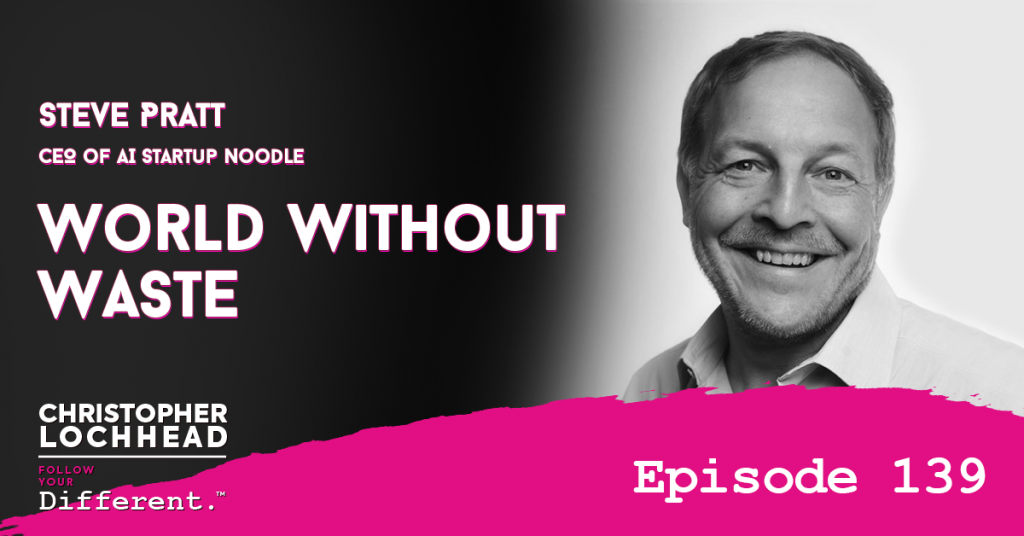
Podcast: Play in new window | Download (Duration: 59:58 — 82.7MB) | Embed
Subscribe: Apple Podcasts | Spotify | Pandora | RSS | More
This is our second in our two-part series on Digital Business, with Steve Pratt, CEO of Noodle.AI, the remarkable startup on a mission to changing global manufacturing and supply chain business.
We have a real conversation about how the combination of Machine Learning / AI, The Cloud, IoT and deep data analytics can come together to reduce both economic and environmental waste.
In case you missed the first part of this two-part series with Business Guru Big Ben Rewis, check it out: Episode 138.
Missionary CEO
Christopher has known Steve for over 30 years. He has a vast and impressive experience in digital marketing, starting with the creation of CRM business for Deloitte. He was also the founder and CEO of the InfoSys Consulting Practice and he also led IBM Watson’s initiatives.
Steve has deep experience in building and managing massively successful, deep technology businesses. He has some powerful insights, through his company Noodle.Ai, into how modern technology can reduce economic and environmental waste. This is what Christopher calls a great example of a missionary CEO, where the E stands for Evangelist.
“The intention of the company is to apply data science to create a world without waste. We reject this notion, historically, that you had to choose between profits and the planet.” – Steve Pratt
World Without Waste
Steve shares how companies have scaled things right now. They have created amazing hyper-growth for their companies, but have also accumulated huge amounts of waste.
“We have over 500 billion dollars of excess inventories sitting in warehouses. We got 50% of trucks driving around, empty. We have about 400B dollar of stuff, that is thrown out in the manufacturing process because of quality defects. These are all preventable.” – Steve Pratt
A lot of people analyzed where the waste is in the world and over 90% of the waste in the world is due to manufacturing and logistics. Steve points out that due to bad computations, companies are manufacturing trillion dollars of goods and let it sit in their storage, because they couldnt get it out to the market.
Environmental Sustainability
Steve shares about steel manufacturing company Big River Steel, which they granted a lead certification for environment sustainability.
“With our applications, that consumption to reduce inventory levels, reduce quality defects and they are the most profitable, per employee, the highest profit per mil hour, the lowest environmental impact of any steel known in the world.” – Steve Pratt
Christopher and Steve then discussed that companies should analyze data that is readily available to them. This is can easily be achieved through the help of various technologies available.
To hear more about how digital businesses can achieve a world without waste and other insights of Steve, download and listen to this episode.
Bio:
Stephen is an instigator, agitator, and pioneer in creating world-class technology services organizations.
He has spent his career building innovative ways to create value for the world’s most important organizations.
Prior to Noodle, he was responsible for all Watson implementations worldwide for IBM Global Business Services.
He also was the founder and CEO of Infosys Consulting, a Senior Partner at Deloitte Consulting, and a technology and strategy consultant at Booz, Allen & Hamilton.
He twice has been selected as one of the top 25 consultants in the world by Consulting Magazine.
He has Bachelors and Masters degrees in Electrical Engineering from Northwestern University and The George Washington University focused on Satellite Communications.
For fun, Steve plays competitive tennis, races sailboats, and formerly was a crazed rugby player. He enjoys playing acoustic guitar for his children (not ready for prime time).
Links:
We hope you enjoyed this episode of Follow Your Different™! Christopher loves hearing from his listeners. Feel free to email him, connect on Facebook, Twitter, Instagram and subscribe on iTunes!
138 Digital Business Guru Big Ben Rewis
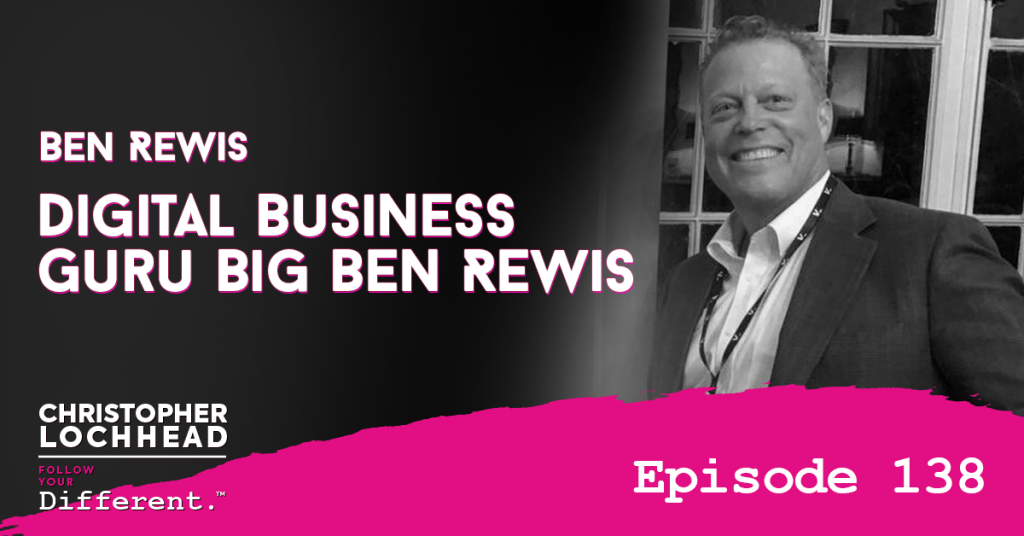
Podcast: Play in new window | Download (Duration: 1:05:16 — 149.7MB) | Embed
Subscribe: Apple Podcasts | Spotify | Pandora | RSS | More
This is our first in a special two-part series on Digital Business. The legendary Big Ben Rewis joins us today to have a real, powerful conversation about digital businesses today and how big data can contribute to sustainability.
In our next episode, watch out for Steve Pratt CEO of Noodle.AI, the remarkable startup changing global supply chains.
Surfer, Snowboard, Advisor
Big Ben is one of the most extraordinary adventure athlete’s of this time. He is a skier, snowboarder, sailor, and surfer. In fact, one of his first few sponsors were Jake Burton, the founder of Burton Snowboards.
Today, when he’s not surfing or on some kind of adventure, Ben Rewis would most likely be dishing digital business advice to Fortune 100 companies and startups in Silicon Valley. He has deep experience in building and managing massively scalable digital business and payments infrastructure.
Digital Business Guru
Just to name a few of Ben’s contributions, he created the Internet e-Commerce team for Visa. He was also Head of Security & Fraud Technology for First Data and he’s an advisor to a startup Verdant Robotics, a startup doing amazing things with AI & Machine Learning in the smart agriculture category.
“I think there’s a lot of themes, there’s a lot of organizational and technical similarity across all of them. The whole notion of data in the digital business is just fascinating, what’s happening in the industry today. Cause you know, like the industry quote ‘software is eating the world.’” – Ben Rewis
Digital Business is the Future
Digital businesses are not brand new, as they have been around a long time.Ben now shares that people are realizing the by-product of their digital business can infect more businesses.
“Digital businesses don’t necessarily have new value-added services that are data-based. They may have a legacy product or service, that is digital and they realizing that the data that is produced by that service can help them generate new revenues, or cut costs.” – Ben Rewis
To hear more about how digital businesses can greatly influence sustainability efforts for the future and other insights of Ben, download and listen to this episode.
Bio:
Ben Rewis was raised in New England north of Boston, the eldest son of two high school teachers.
After graduation from The Stowe School in VT., he moved to San Francisco, CA at age 17 and have been in technology ever since.
Today, he’s an advisory consultant to startup CEOs, and a deep payments expert with solid leadership and innovation skills.
Facilitator, speaker, communicator, thinker and doer, able to bring different constituencies together around a common digital business vision and set of deliverables.
Able to drive from big picture down to concrete initiatives. Passionate about helping teams solve challenges for strategic alignment.
In addition to his business involvement with major companies, he has decades of wilderness and group leadership experience, becoming an Outward Bound instructor at age 21, and taking part in numerous adventure expeditions around the world.
He’s crossed deserts and canyons, sailed the Tasman Sea, and climbed mountains like McKinley.
He enjoys just about all board sports, competed in the first world championships for snowboarding, and learned to surf at age 40.
Ben co-founded the Drop In Coalition, and is an Advisory Board Member of the Save The Waves Coalition, and was honored in 2019 as a Royal Geographic Society Fellow.
Links:
We hope you enjoyed this episode of Follow Your Different™! Christopher loves hearing from his listeners. Feel free to email him, connect on Facebook, Twitter, Instagram and subscribe on iTunes!
137 Sex & Intimacy w/ Alice Little #1 Companion At Moonlite Bunny Ranch

Podcast: Play in new window | Download (Duration: 43:02 — 59.4MB) | Embed
Subscribe: Apple Podcasts | Spotify | Pandora | RSS | More
This is a very special episode and a very different episode. Part 1 was with Intimacy Coach Allana Pratt. Today, for Part 2 in our series on Intimacy and Sex, we welcome Alice Little, legal sex worker and #1 Luxury Companion at the Moonlite Bunny Ranch in Carson City, Nevada USA.
We get into it! Why Alice loves her job, why she says it’s all about connection, communication, and intimacy, what it’s like to use her service and why nothing is too kinky!
Job Unlike Any Other
Alice describes herself as a legal sex worker, sex educator, and intimacy expert. She used to travel in the Midwest, educating about sex until she was introduced to brothels. She found out that brothels are a unique place to work. All other sex workers have different work experiences from each other
“My job very much so isn’t just sex. It’s so much more than that. It’s communication, connection, intimacy and teaching people how to love themselves.” – Alice Little
Radical Self-Acceptance
From a different perspective, she shares that one of the things she does is to teach people how to connect to their bodies, through radical self-acceptance. Through the acts of connection with clients, Alice shares it gives them the ability to connect deeper with themselves and appreciate who they are.
When asked what it is liked to have sex with her, Alice nonchalantly shared it’s life-changing.
“Oftentimes it changes the entire way people have sex moving forward. Like when is the last time you asked your partner and say ‘show me what feels nice’ and people say ‘oh shit, I have literally never uttered those words in the bedroom. I barely had sex with the lights on, let alone had a conversation while getting into that’ and I enable people to do that. It is really eye-opening.” – Alice Little
Stigma With Sex
Alice continued to share her views about sex, and she says it is something highly stigmatized in this country. A brothel is a safe place for Alice, where people can ask questions and expect not to be judged. Nothing is taboo and there is no judgment in brothels.
“I’m very, very comfortable helping people and enabling them to explore things that they probably couldn’t in their day to day lives.” – Alice Little
Alice shared a lot about the process of booking appointments, touring the ranch and the types of experiences she offers. Pay special attention to her advice on how we can improve our sex lives. She even talks about how she markets herself and her marketing advice for you.
To listen more about Alice’s advice on intimacy and sex, download and listen to this episode.
Bio:
Alice Little is the highest-earning sex worker in the United States. Little wrote in a Huffington Post op-ed that she makes $1 million per year from working in Nevada.
Little is a native of Ireland and moved to the U.S. at the age of 5 and grew up in Lond Island, New York. Thanks to her 2017 article, “A Week as a Legal Sex Worker In Mound House, NV, On A $267,000 Salary, and appearances on Tim Ferris’s podcast, Little has become a well-known advocate for sex workers across the world.
Little began her career as a sex worker at the Sagebrush Ranch in 2015. In 2017, Little moved to the Moonlite Bunny Ranch where she was the most booked sex worker in the United States for two years in a row.
Links:
Youtube: Moonlite Bunny Ranch Tour with Alice Little
We hope you enjoyed this episode of Follow Your Different™! Christopher loves hearing from his listeners. Feel free to email him, connect on Facebook, Twitter, Instagram and subscribe on iTunes!
136 Intimacy & Sex w/ Allana Pratt

Podcast: Play in new window | Download (Duration: 56:22 — 77.8MB) | Embed
Subscribe: Apple Podcasts | Spotify | Pandora | RSS | More
Yup, we’re doing it! For this week, we have a two-part special on Intimacy and Sex. In this episode, everyone’s favorite intimacy guru and coach, Allana Pratt.
This conversation is a wonderful, magical mystery tour about intimacy, pain, pleasure, how we actually feel through our hearts, and a lot more! Pay special attention toward the end, when Allana gives her ideas for some fun things to do with your partner on Valentine’s day!
Next episode, watch out for Alice Little, the two-time, #1 Companion of the Year at Nevada’s Moonlite Bunny Ranch. It is everything you ever wanted to know about her profession and what she thinks you can do to spice up your sex life.
Valentine’s Day is Stupid
The conversation started off with Allana sharing her thoughts about the upcoming Valentine’s Day. As much as it feels like an obligation for couples to spend, she also shares its a good holiday to make an extra effort for partners.
“I think Valentine’s day is a manufactured, stupid-marketing-hiccup-the-prices-of-roses-and-restaurants and it generally pisses most people off as it feels like an obligation, right?” – Allana Pratt
Every day is Valentine’s Day
Valentine’s day is a great opportunity to remind ourselves that we might have been taking our partners for granted. Allana further shares that if you don’t take time and energy to plan romantic things with your partner, it’s gonna wither. Because of this, she looks at the blessing of Valentine’s day as a reminder.
Christopher also shared his love story in this episode, about how she met her wife Kari and how a similar experience in their lives brought them together. Christopher admits its Valentine’s every day when he is with Kari.
Pain, Heart Over Brain and Others
Allana shares a lot more interesting insights in this episode. Why it is better to feel pain and be humbled earlier in your lives. What intimacy means and how self-love can define how intimate you can become. She also touches a part about the importance of feelings to be able to tap unto different kinds of powers such as strong intuition.
“You can’t think your way to coherence, harmony, kindness, love. You have to feel your way there. That is also been scientifically proven.” – Allana Pratt
To listen more about Allan’s advice on intimacy and sex, download and listen to this episode.
Bio:
Intimacy Expert, Allana Pratt inspires open-hearted, unapologetic living with delicious sass.
Her inspiring vulnerability and courage has landed her a featured weekly column on the GoodMenProject, featured as an Icon of Influence, and as Guest Expert on The Jenny McCarthy Show, Huffington Post, People Magazine, Forbes, CBS, TLC and FOX.
This cum laude graduate of Columbia University is the Author of 4 books, has interviewed Whoopi Goldberg, Alanis Morissette and Dr. Bernie Seigel and Hosts the edgy Podcast “Intimate Conversations” where listeners learn to thrive after heartbreak and find the relationship they deserve.
A certified coach, Allana was asked by Leeza Gibbons to coach her during Dancing with the Stars. With over 4 million viewers on YouTube, Allana is the go-to authority when struggling to trust again after a harsh breakup so followers can create healthy, thriving intimate relationships with themselves first, which naturally attracts their ideal match.
Links:
We hope you enjoyed this episode of Follow Your Different™! Christopher loves hearing from his listeners. Feel free to email him, connect on Facebook, Twitter, Instagram and subscribe on iTunes!
135 Restoring the Soul of Business w/ Rishad Tobaccowala
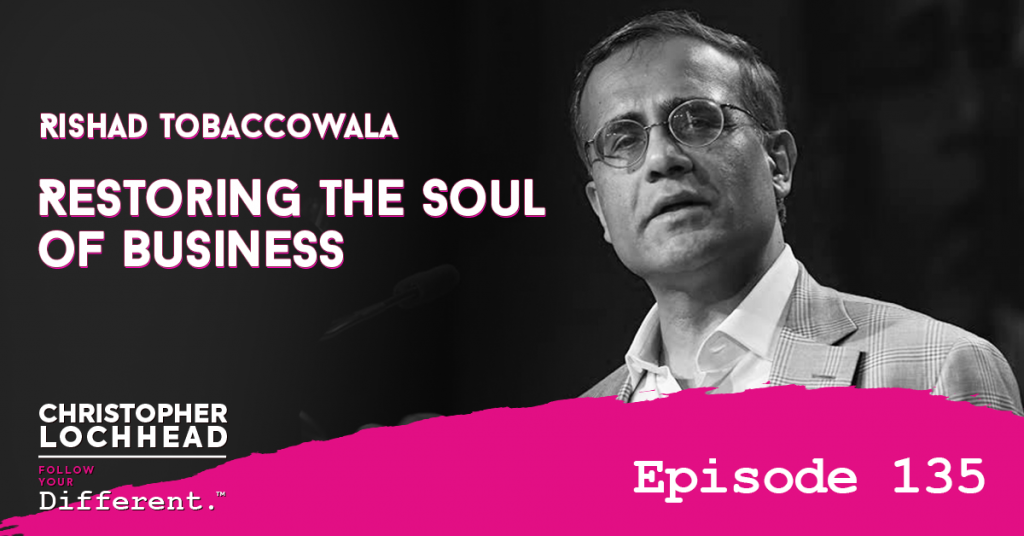
Podcast: Play in new window | Download (Duration: 51:39 — 71.3MB) | Embed
Subscribe: Apple Podcasts | Spotify | Pandora | RSS | More
Today, we feature another great author in this series. Rishad Tobaccowala is the Chief Growth Officer at Publicis Groupe, an advertising and communications firm with 80,000 people! He has a brand new book, Restoring the Soul of Business.
We talk about how business leaders are overly focused on spreadsheets, why the best companies are like religions, the importance of being human beings at work!
Spreadsheet, Story, and Soul
Over the last few years where things are moving extremely fast because of technology, data, financial and twitchiness of time, Rishad shares that companies have started tilting towards the spreadsheet side of the business, which is measurable, data-driven and financial.
However, for Rishad, a successful company is one who can marry both the spreadsheet side of the business and the story of the business, which is about the culture, the purpose, values, emotion, and talent of the company.
“The soul of the business is when you combine the story and the spreadsheet in a way that you have a viable growing business with viable growing people, in a community that is also viable.” – Rishad Tobaccowala
Business Is For Citizens
Rishad believes that its time to optimize the business for the citizen, and not for the consumer. He discussed about this during his talk last January 2019, addressing professionals from Apple, Amazon, Google and Facebook.
“What we’ve created is something incredible in both the empowerment, the connections, and the wealth creation opportunities. At the same stage, there is a downside, which is, increased inequality, increased polarization and to a great extent, a break down of trust. Could it be, that in chasing just the data side of the spreadsheet side, we lost the souls of our businesses?” – Rishad Tobaccowala
The Purpose of A Company
The first one is to ensure that its four constituencies are looked after. The four are
(1) people who they serve – customers, members, users, consumers
(2) the talent that works in the company
(3) community in which the company or the companies offices and factories are based and
(4) the country in which that particular segment of the company is based.
Rishad shares that the 2nd part of the company’s reason to be.
”To generate financial profit which basically allows the company to both reinvest in all those first four criteria, as well as continue to grow because to me, growth is an important thing, but growth measured across those four indicators.” – Rishad Tobaccowala
The third one is how companies create purpose, value, meaning, and connections for life.
To listen more about Rishad’s advice to restore the soul in the business, download and listen to this episode.
Bio:
Rishad is Chief Growth Officer and member of the Management Committee of Publicis Groupe, the world’s third largest communication firm with 80,000 employees.
BusinessWeek named Rishad as one of the top business leaders for his pioneering innovation and TIME magazine dubbed him one of five “Marketing Innovators.
Rishad’s first book “Restoring the Soul of Business: Staying Human in the Age of Data” will be published globally on January 28, 2020.
Re-Inventing blog features some of his writings.
Prior to his current role, Rishad was the Chief Strategist and Member of the Directoire/+ of Publicis Groupe.
Before his corporate role, Rishad was the Chairman of DigitasLBi and Razorfish. Publicis Groupe owns these two global firms, with over 10,000 employees around the world focused on marketing and business transformation.
Rishad has 36 years of experience around the world and helped grow, founded/co-founded or incubated a variety of companies including VivaKi, Leo Burnett, Starcom, SMG Next, Starcom IP, Giant Step, Play, and Denuo.
Rishad has a BS in Mathematics from the University of Bombay and an MBA in Marketing and Finance from the Booth School of Business at the University of Chicago.
Links:
Book: Restoring the Soul of Business: Staying Human in the Age of Data
We hope you enjoyed this episode of Follow Your Different™! Christopher loves hearing from his listeners. Feel free to email him, connect on Facebook, Twitter, Instagram and subscribe on iTunes!
134 Wisdom At Work w/ Chip Conley
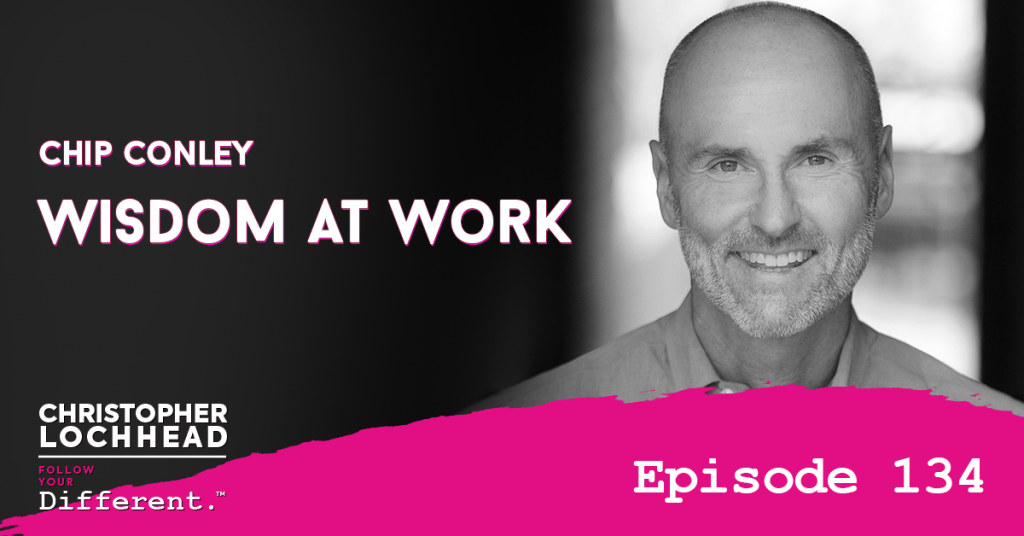
Podcast: Play in new window | Download (Duration: 56:44 — 78.3MB) | Embed
Subscribe: Apple Podcasts | Spotify | Pandora | RSS | More
This is a powerful conversation about mid-life design with Chip Conley. He used to be the CEO of the second-largest based boutique hotel in the US. He then ended up joining Air BNB, to help the young founders of Airbnb navigate their growth in the hospitality category.
Today, we talk about why Chip thinks people at their mid-life need to do a reset. Listen for what Chip calls his “emotional equation” and more ideas, based on Chip’s new book Wisdom at Work.
Boy Wonder to Modern Elder
As we continue our run of legendary authors and entrepreneurs, we converse today with Chip Conley. He’s the founder of Joie de Vivre Hospitality, the second-largest operator of boutique hotels in the United States. He started in 1987 at age 26 and held the position of CEO for nearly 24 years.
In 2010, after having created and managed 50 boutique hotels mostly in California, Conley sold his company. He later joined the young business leaders of Airbnb. Today Air BNB is the company that created and now dominates a new travel category
“I was brought in as the old guy, to help them, because of my hospitality and leadership experience. But they taught me, as much as I taught them.” – Chip Conley
Hard Truths for Midlife Professionals
Chip candidly shares that unfortunately, for a lot of people in midlife and later is, they are not open to being curious.
“They don’t want to look like an idiot at age 45 or 50 and so they’re not actually that open to learning from someone younger than them. Yet, 40% of Americans today have a boss that is younger than them and by the year 2025, the majority of Americans will have a boss younger than them.” – Chip Conley
He further added that we live in an era of digital intelligence. There is an impression that younger people are digital natives. They have more fluency and ability to learn in the digital world, hence tech companies usually hire them for senior roles.
The Modern Elder Academy
People in their midlife often ask, “how do I press the reset button?” Chip shares that one of the reasons why he created the Modern Elder Academy is to have a place for middle age professionals to have a pitstop in their lives.
He stresses the importance of asking the following questions:
“What mastery have I mined? What wisdom have I cultivated and how can I harvest it? How can I repurpose it and frankly, what is it that I really want to do in my life, because I have been living the life that my parents wanted for me to live.” – Chip Conley
To listen more about Chip’s advice to midlife professionals in getting wisdom at work, download and listen to this episode.
Bio:
Chip Conley
The iconic boutique hotelier who helped Airbnb’s founders turn their fast-growing tech start-up into a global hospitality brand, Chip Conley is a New York Times bestselling author whose manifesto on ageism, Wisdom@Work: The Making of a Modern Elder, is inspired by his experience of being both a mentor and an intern in his 50s.
After selling the company he started as a rebel entrepreneur at age 26, Joie de Vivre Hospitality, Chip wasn’t sure what was next. He could have retired at age 52. But the young founders of Airbnb came calling.
He served as Airbnb’s Head of Global Hospitality & Strategy for four years — while also being CEO Brian Chesky’s mentor — and continues today as a Strategic Advisor to the company’s leadership.
While writing Wisdom@Work, Chip was inspired to build the world’s first “midlife wisdom school,” the Modern Elder Academy, with a 3-acre oceanfront campus in Baja California Sur, Mexico.
Chip is an active mentor to six young CEO founders in the hospitality/tech world, and serves on the board of Encore. org and the advisory board for the Stanford Center for Longevity. He believes curiosity is the elixir of life and started learning Spanish and surfing at age 58.
Links:
Modern Elder Academy Interview
We hope you enjoyed this episode of Follow Your Different™! Christopher loves hearing from his listeners. Feel free to email him, connect on Facebook, Twitter, Instagram and subscribe on iTunes! Get amazing, different stories on business, marketing, and life. Subscribe to our newsletter The Difference.
133 New York Times #1 Best Seller Ryan Holiday On Stillness, Wisdom, Faith, Peter Thiel & More
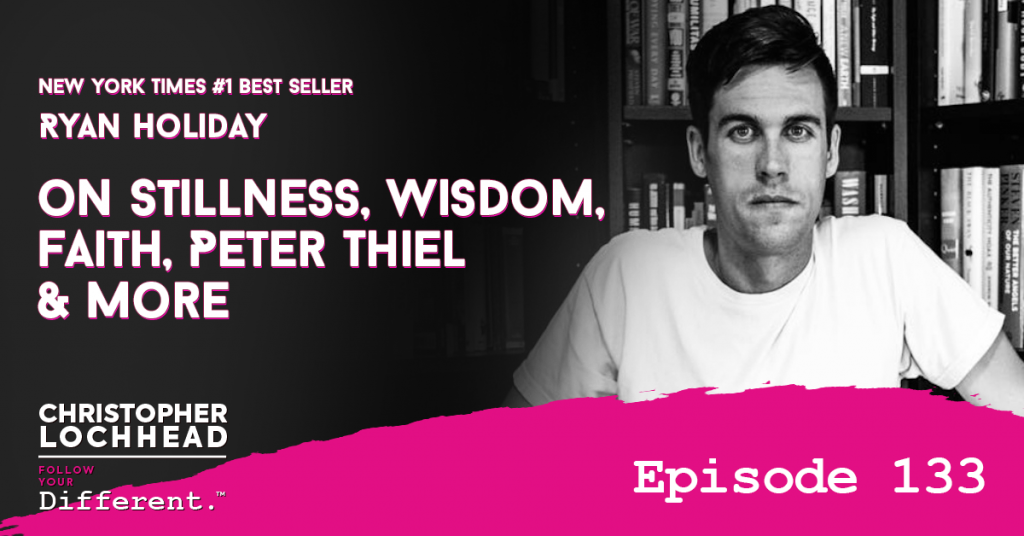
Podcast: Play in new window | Download (Duration: 54:26 — 75.0MB) | Embed
Subscribe: Apple Podcasts | Spotify | Pandora | RSS | More
We continue our run of legendary Authors and today, our guest is NYT #1 Best Selling author Ryan Holiday. Ryan is one of the most important writers of our time and hanging out in his brain, makes you a different person! We talk about stillness, wisdom, faith, Peter Thiel and more!
Interesting Topics
Ryan is the author of Conspiracy: Peter Thiel, Hulk Hogan, Gawker, and the Anatomy of Intrigue. The book is interesting enough as it is about how Paypal founder Peter Thiel took down Gawker Media, through a grand scheme that was founded on the issue with Hulk Hogan. Apparently, Gawker Media publicized an illicitly recorded home sex tape of Hogan.
He also authored the books The Obstacle is the Way, Trust Me, I’m Lying and Growth Hacker Marketing” Ego Is the Enemy. Today, he shares about his recent book Stillness is the Key.
“In stillness, I’m illustrating stoic ideas with stories from Zen philosophy and vice versa. I always want to be seeking out deeper ideas and diverse ideas. I think that’s ultimately how you learn and how you triangulate real truths.” – Ryan Holiday
Old Soul
Christopher remarked how Ryan reminds him so much about Adele, as he is an old soul stuck in a 30-something body. Christopher was astounded with his choice of topics ranging from Rome, Greece, Ancient History and the like. He is none like his contemporaries who are busy with social media and mindless online content.
“I got an advise a long time ago that you should write what you’re afraid about, or write what you are unsure about.” – Ryan Holiday
Probably one controversial part of the book is the discussion about faith.
“Part of this idea of surrender is saying ‘you know what, I’m going to accept this uncertainty a little bit. I will accept that this isn’t all about me, that I don’t know everything. I’m going to accept that there is “something” operating behind the scenes that have an agenda or perspective, or indifference to a regular human problem or issue.” – Ryan Holiday
Stillness
Ryan shares how his conversation went with the publishers for his new book. He says he does not claim it as The Ryan Holiday philosophy as he merely translated and popularized the tried and tested ideas of smart people
To listen more about what Ryan learned while doing marketing for fallen fashion brand “American Apparel” and more on faith, wisdom and stillness, download and listen to this episode.
Bio:
Ryan Holiday is one of the world’s foremost thinkers and writers on ancient philosophy and its place in everyday life.
He is a sought-after speaker, strategist, and the author of many bestselling books including The Obstacle Is the Way; Ego Is the Enemy; and The Daily Stoic.
His books have been translated into over 30 languages and read by over two million people worldwide. He lives outside Austin, Texas, with his family.
Links:
Good Reads – Stillness is the Key
We hope you enjoyed this episode of Follow Your Different™! Christopher loves hearing from his listeners. Feel free to email him, connect on Facebook, Twitter, Instagram and subscribe on iTunes!
132 Sizing People Up w/ FBI Agent Robin Dreeke
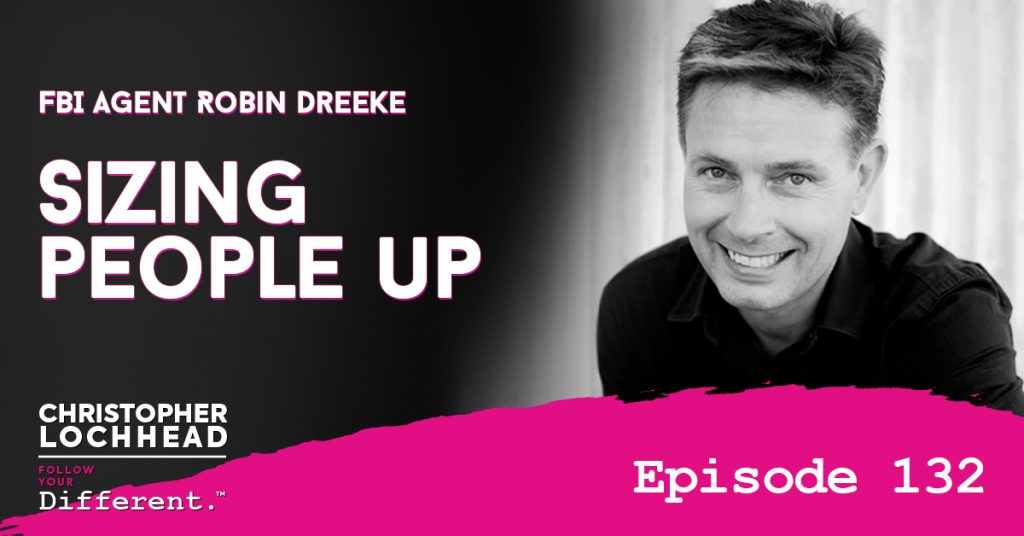
Podcast: Play in new window | Download (Duration: 1:10:20 — 96.8MB) | Embed
Subscribe: Apple Podcasts | Spotify | Pandora | RSS | More
In this episode, we continue our run on legendary authors. We hang out with former Marine, FBI agent and Chief of the FBI Counterintelligence Behavioral Analysis Program, Robin Dreeke.
This guy used to hang out with foreign spies in an effort to get them to turn on their countries and help the US. He’s got some insanely valuable experience in how to communicate, and relate to people.
Detecting Lies
Christopher asked one of the most pressing questions any FBI agent has been asked, ‘how do you detect lying?’ Robin candidly shares “you don’t.” He further shares that even the best people in the world have 50% accuracy when it comes to detecting deception.
Instead, what Robin looks for when speaking to a “subject” are verbal and non-verbal signs of stress.
“I never like to tell someone or think that someone is deceiving or lying, I just think in terms of ‘they don’t have transparency with me.’” – Robin Dreeke
Famous Cop Questions
One of the most famous cop question, as seen in movies, is the suspect’s whereabouts. Robin shared what these cops are looking for is a direct answer.
Robin personally shared his personal guidelines when he is questioning a subject: (1) Seeking thoughts and opinions, (2) Speaking in terms of their priorities, (3) Validating them and (4) Empowering them with choices;
Similarities With Sales
Robin shares that he must have had the hardest sales job in the world. His product is selling American patriotism to foreign diplomats, wherein affiliation is also considered to be illegal.
“From rapport, you build trust. From trust, you get a healthy relationship.” – Robin Dreeke
Other than that, he confirms that his learnings, which he wrote in the book Sizing People Up is highly beneficial to sales or business people in general.
For the part where Robin talks about the real FBI secret for solving crimes, download and listen to this episode.
Bio:
Robin is a best-selling author, professional speaker, trainer, facilitator, and retired FBI Special Agent and Chief of the Counterintelligence Behavioral Analysis Program. Robin has taken his life’s work of recruiting spies and broken down the art of leadership, communication, and relationship building into Five Steps to TRUST and Six Signs of who you can TRUST. Since 2010, Robin has been working with large corporations as well as small companies in every aspect of their business. Whether it is newly promoted leaders, executives, sales teams, or customer relations, Robin has crafted his People Formula for quick results and maximum success.
The Military Leader
Although Robin always aspired to become a great leader, he realized from his time at the United States Naval Academy and in the United States Marine Corps that leadership was much more than just telling people what to do: a great leader uses interpersonal skills to inspire action, rather than demand the compliance of others.
The Spy Catcher
Upon entering service as an FBI Special Agent in 1997, Robin began his journey as a counterintelligence specialist and behaviorist in the agency’s efforts to thwart the efforts of our country’s greatest adversaries. Serving in New York City, Norfolk VA, FBI Headquarters, Quantico VA, and Fredericksburg VA, Robin received advanced training and experience in the area of social psychology and the practical application of the science behind relationship development and trust, ultimately leading the FBI’s elite Behavioral Analysis Program.
The Behavioral Analysis Expert
Robin has built his highly effective tools for all aspects and stages of interpersonal communication and relationship development. Robin has combined all these tools and techniques and created a one-of-a-kind formula for success with people. Today, Robin is a recognized expert, author, and gifted lecturer in the art of interpersonal communication, relationship building and Trust. These skills are used every day in leadership, sales, human resources, and all aspects of life, both business and personal. CBD oil and capsules Hemp oil – H Drop UK H Drop UK
Links:
We hope you enjoyed this episode of Follow Your Different™! Christopher loves hearing from his listeners. Feel free to email him, connect on Facebook, Twitter, Instagram and subscribe on iTunes!
131 How to Build Billion Dollar Startups w/ David Sacks
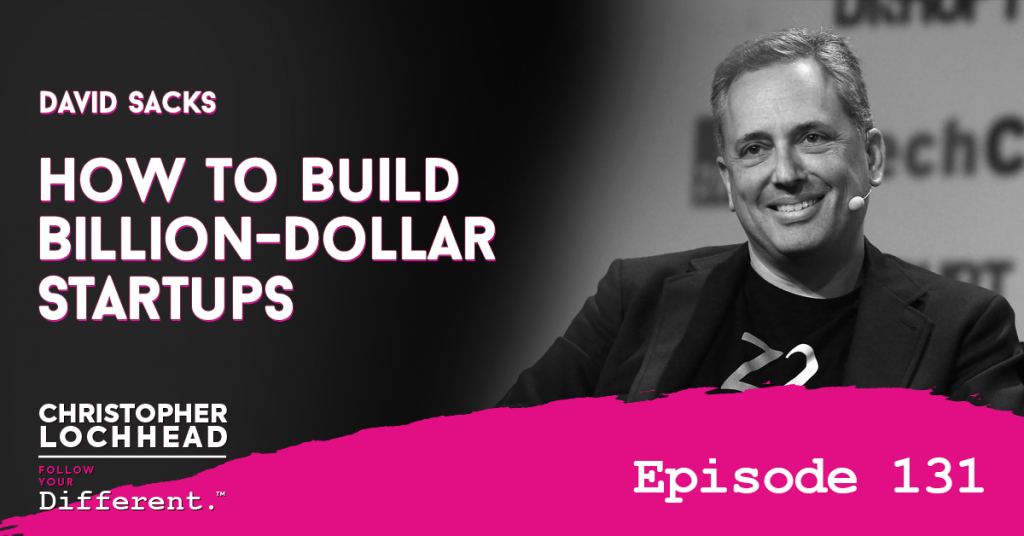
Podcast: Play in new window | Download (Duration: 1:00:03 — 82.7MB) | Embed
Subscribe: Apple Podcasts | Spotify | Pandora | RSS | More
In this episode, we have a real conversation about legendary entrepreneurs and investor David Sacks about how to build billion-dollar startups.
We talk about how startups go off the rails and what is ok and not ok to lose money on. We also touch on why B2C strategies have become powerful for B2B companies and many more! If you’re an executive or an entrepreneur, even if you’re outside of tech, get your pen ready. there’s a ton on this episode!
Legendary VC
We continue our run of legendary VCsc with David Sacks. He was a co-founder of PayPal, Founder, and CEO of Yammer and Founder of Craft Ventures. Some of his investments include Facebook, Uber, SpaceX, Palantir Technologies, Airbnb and Bird
This is another great example of the power of a real dialogue podcast.
“You know the old line of ‘nobody ever got fired for buying IBM’? I think that the modern version of that saying would be ‘no one ever got fired for buying the category leader’ and if you become the category leader, you just get all these sales by default.” – David Sacks
Going Off The Rails
David shares how he witnessed high profile companies going off the rails for several reasons. He noted that aside from product-market fit, there are other mundane reasons why these companies fail. Here’s the big list that could go wrong in high growth companies:
“One is commoditization, the rest of the world catches up the startups innovation. Two, cost of customer acquisition, a bunch of reasons it could happen. Third, margin problem, negative gross margins. Fourth, external dependency. Fifth, leaky bucket, there’s a problem with retaining customers. Sixth, regulatory compliance, then, sales compliance problem, that’s seven. Eight, doing things that don’t scale. Nine would be the founder psychology problem which is pushing things too far and tenth, company culture problem. One the 10.1 mark, macro shock where the company goes out for financing and isn’t able to raise around because of one of the problems I mentioned in them. Everything comes to head and you had a car crash.” – David Sacks
The Challenge for Startups
One of the greatest fears of startups Is commoditization. David says there is always a risk of the competition catching up in terms of software design. He encourages startups that it is a trade-off to make, to move fast enough to maintain market leadership.
“Everyone is running around with their hair on fire but they’re afraid that their innovation gets copied. If you’re not moving fast enough, you’re on a bit of hamster wheel. If you’re not moving fast enough, you’re running in place.” – David Sacks
To hear about David’s thoughts on how to define and dominate a market category, what areas of technology David thinks have the most promise and more, download and listen to this episode.
Bio:
David Sacks is a highly accomplished entrepreneur and investor in internet technology firms.
He is general partner of Craft Ventures, a venture capital fund he co-founded in late 2017. Previously as an entrepreneur, Sacks was the founding COO and product leader of PayPal (acquired by eBay in 2002 for $1.5 billion) and Founder/CEO of Yammer (acquired by Microsoft in 2012 for $1.2 billion).
In 2016, he led the turnaround of Zenefits as interim CEO.
In 2017, Sacks co-founded blockchain startup Harbor as an incubation of Craft Ventures.
His angel investments include Facebook, Uber, SpaceX, Palantir Technologies, Airbnb and Houzz.
Links:
We hope you enjoyed this episode of Follow Your Different™! Christopher loves hearing from his listeners. Feel free to email him, connect on Facebook, Twitter, Instagram and subscribe on iTunes!

